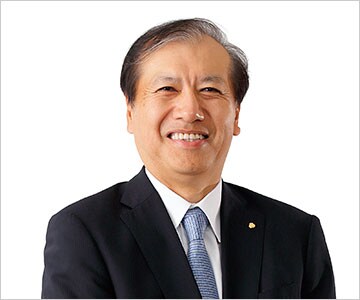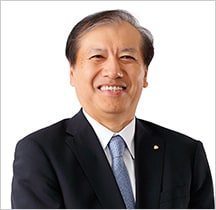Corporate GovernanceTDK's Governance:


High hopes for new President Shigenao IshiguroAn outstanding presence capable of growing the business and raising TDK performance
I serve as chairman of the TDK Nomination Advisory Committee. In approaching the Committee's screening of candidates for president, I strongly believed that the role and the tenure of the President were key points. With 10 years having passed since former President Takehiro Kamigama assumed that post, along with other considerations, we thoroughly discussed what type of system to establish to ensure sustainable growth for TDK going forward.
Among the comments made, it was stated that in the case of TDK, a tenure of 10 years is certainly not short in view of the process from the manufacturing of materials through to development in creating any given product. However, the term of president and the product development cycle do not necessarily coincide. The Committee held numerous meetings, with discussions rooted in the perspective of it being preferable for TDK to be led by someone cut out to serve the interests of our stakeholders, how to build a system in support of such a figure, and whether the term of office should be determined on that basis. We also held numerous interviews. This was not limited to the Nomination Advisory Committee, with similar interviews arranged by outside experts and other concerted efforts made to uphold fairness and transparency.
Former President Kamigama established a solid track record for structural reform, aggressive M&A, and other new approaches. We wanted someone capable of shouldering the role of bringing such progress to even greater fruition, and further raising the performance of TDK.
Regarding the HDD magnetic heads business, a sector for which the market has continued to be harsh, new President Shigenao Ishiguro has acted with poise and wisdom in firmly dealing with the issues at hand. He conveys the impression of someone ready to exercise the leadership needed to take charge and get the job done, even in the event of crisis. Furthermore, he has followed the practical road of reappraising the HDD magnetic heads development and production systems, while maintaining a global mindset. Upon the acquisition of Micronas, it is my understanding that Micronas management initially expressed little desire in tying up with a Japanese company. Mr. Ishiguro responded by getting directly involved in the negotiations, persevering with continued discussions on how TDK was ready to put Micronas technology to fruitful use. An agreement was finalized in the end, with the continuation of brisk deliberations utilized to formulate a strategy geared to take full advantage of the TDK Group's sensor technology. We arrived at the decision that such skills are dearly needed to build the next-generation TDK.
President Ishiguro is truly a man who inspires confidence in his profound knowledge of key technologies, and the ability to generate results. We have high expectations that he will lead TDK with a firm hand, acting in a capacity much like that of a “baseball closer” in securing victories in the end.
Grasping the philosophy of the Corporate Governance Code, building effective governancePursuit of genuine diversity in laying the groundwork for global development
A year has passed since the introduction of the Corporate Governance Code of Japan. While I understand that there is much debate over this matter, I also feel that the Corporate Governance Code provides a good opportunity to change how Japanese companies operate, thereby substantially raising their competitiveness over the medium to long term.
In my view, the decision to enact this code began with debate over how to improve the approaches of Japanese companies that have failed to demonstrate competitive strength on the global market. It is true that U.S. companies, overseas investors, and others have made harsh observations in this area. We must not conclude, however, that U.S. companies always approach their management with short-term vision. On the contrary, such enterprises tend to constantly redefine their business domains, striving to put their management on sound footing and further enhance competitiveness on a medium- to long-term basis. In other words, they carry on reforms to shape their businesses to meet the conditions of the new era. It is their board members, investors, and other stakeholders, moreover, who strictly assess the appropriateness of those reforms. In my opinion, such mechanisms have been inadequate in Japan.
It is important to not simply improve appearances, achieve numerical targets, and make other superficial progress. Of greater significance is the degree of commitment that top managers devote to generating high business earnings over the medium to long term. In that sense, I believe that the Corporate Governance Code will bring positive change to Japanese companies from the inside.
There is a proverb that can be roughly translated as, “Ploughing the field but forgetting the seed.” That is, even when the most outstanding rules are in place, failing to put them into practice will prevent progress in the desired direction. In that regard, I give TDK high marks for spreading recognition of the importance of governance throughout its entire management level, and the functioning of that governance in an effective manner. The Company took progressive steps in that direction from early on, such as disclosure of the evaluations of its Board of Directors to the outside. On the business management front as well, TDK has stated its target figures for operating income and ROE in the Medium-Term Plan, with the Board engaging in ongoing deliberations of how best to reach those goals.
This attitude extends to the establishment of global governance as well. On this front, it is my impression that TDK has avoided the passive approach of adopting such governance in appearance alone. Recognition of the crucial need for such controls when deploying global operations has supported progress in this area. TDK has grown its business on the strength of respect for the methods used to hire local personnel and advance commercial operations. This awareness can be seen in the extensive delegation of authority and consignment of management leadership to local operations, along with the fact that seven out of the 17 corporate officers at TDK are non- Japanese. While the term “diversity” has become a popular buzzword of late, TDK is truly pursuing the essence of “diversity” in the quest to heighten its corporate value. I view that degree of commitment as being rare among Japanese companies. In the near future, furthermore, I believe that we may also very well see non-Japanese appointed to head the top management team or posts close to that level.
The continuing quest to earn high expectations in the eyes of investorsSupporting the TDK mission for dynamic reform through governance
TDK is on the road to big change. These endeavors are not limited to aggressive M&A, with energetic pushes also underway toward major makeovers in the company's business portfolio, consolidation and new establishment of its domestic and overseas bases, and on other fronts. One factor fueling this trend is moves by customers to switch from domestic Japanese manufacturers to Asian, North American, and other overseas makers recording striking growth. We have likewise seen increases in emerging overseas corporate ventures successful in innovation and other new category customers. Conventional Japanese business practices and other means used to date are no longer adequate to forge deep ties with such new customers and effectively address their needs. To quickly identify the requirements of customers advancing diversification in quality, delivery and cost, and establish speedy development and production systems, TDK must continue to dedicate itself to the never-ending pursuit of innovation.
Though TDK is bolstering its sales in electronic components for automobiles, today's demands are not limited to safety alone. The level of electronic components geared for vehicles built for automonous driving and other new intelligence, sensors closely matched to mobility systems, and other customer demands directed at our products continues to intensify. To respond to such desires, bold steps must be taken to concentrate the technology, engineering capacity, and other TDK strengths to build systems capable of marketing such developments. I am confident that as it advances this type of process, TDK will succeed in raising the level of its competence overall.
Over these past 20 years, TDK has truly dominated the market in the HDD magnetic heads business. Knowledge of this particular pattern for success is a precious asset. There are ample opportunities for applying the know-how cultivated in HDD magnetic heads and other areas to sensors and actuators, energy units, next-generation electronic components and other strategic growth products. As one of our outside directors, I will continue to keep a keen watch, steeped in high expectations, on just how far TDK can progress in the electronic components industry, a field that has clearly entered a new stage in its development and growth.
View the full text of “Corporate Governance” on the PDF version.
Corporate Governance
Expectations and Thoughts for TDK
— TDK's Governance Viewed
by an Outside Director
Outside Director
Chairman of the Board of Directors
Chairman of the Nomination Advisory Committee
Chairman & CEO, INNOTECH CORPORATION
Makoto Sumita